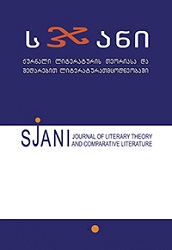ფაუსტის მსოფლმხედველობა და პანსოფიზმი (მაგია)
Faust’s Worldview and Pansophism (“Magic”)
Author(s): Konstantine BregadzeSubject(s): German Literature, Theory of Literature
Published by: ლიტერატურის ინსტიტუტის გამომცემლობა
Keywords: Goethe; Faust; Mephistopheles; Pansophism;
Summary/Abstract: The article deals with the main character in Goethe’s tragedy Faust, namely Faust, and defines the specifics of his worldview: it is based, on the one hand, on mysticism and irrationalism, and on the other hand, on the type of rationalism characteristic to enlightenment, and empiricism in particular. Faust’s point of view is a combination of various irrational-mystical Theosophical or theological doctrines, such as neo-platonic Pansophism, Apophatic of pseudo-Dionysus the Areopagite, the metaphysics of Leibniz (Deism and Monadology); Faust at the same time can be regarded as the representative of the ideas of the German Enlightenment philosopher, Christian Wolf, as well as Newtonian- Lockian type of English empiricism. First of all, what should be underlined about Faust’s ideology is that he can be perceived as an “Apophatic Theologian”. His following words told to Gretchen are rather interesting in this regard: “Sweetest being, don’t misunderstand me! Who dares name the nameless? [...] I have no name for it! Feeling is all: Names are sound and smoke, Veiling Heaven’s bright glow” (V. 3432, 3455-3458). (The English translation of Goethe’s Faust belongs to A. S. Kline, who translated and published it into English in 2003). Hence, it is obvious that the positive naming of God, a kind of nominalism, is totally unacceptable for Faust; it is inconceivable to him that the imperfect language of an imperfect mortal man might be able to perfectly reflect and convey the unknowable essence of infinite divinity. Therefore, the approach of Apophatic theology is acceptable for him –the “negative” and back warding of God’s name, that He is unspoken, unknowable, obscure, foreign, etc.
Journal: სჯანი
- Issue Year: 2020
- Issue No: 21
- Language: Georgian

